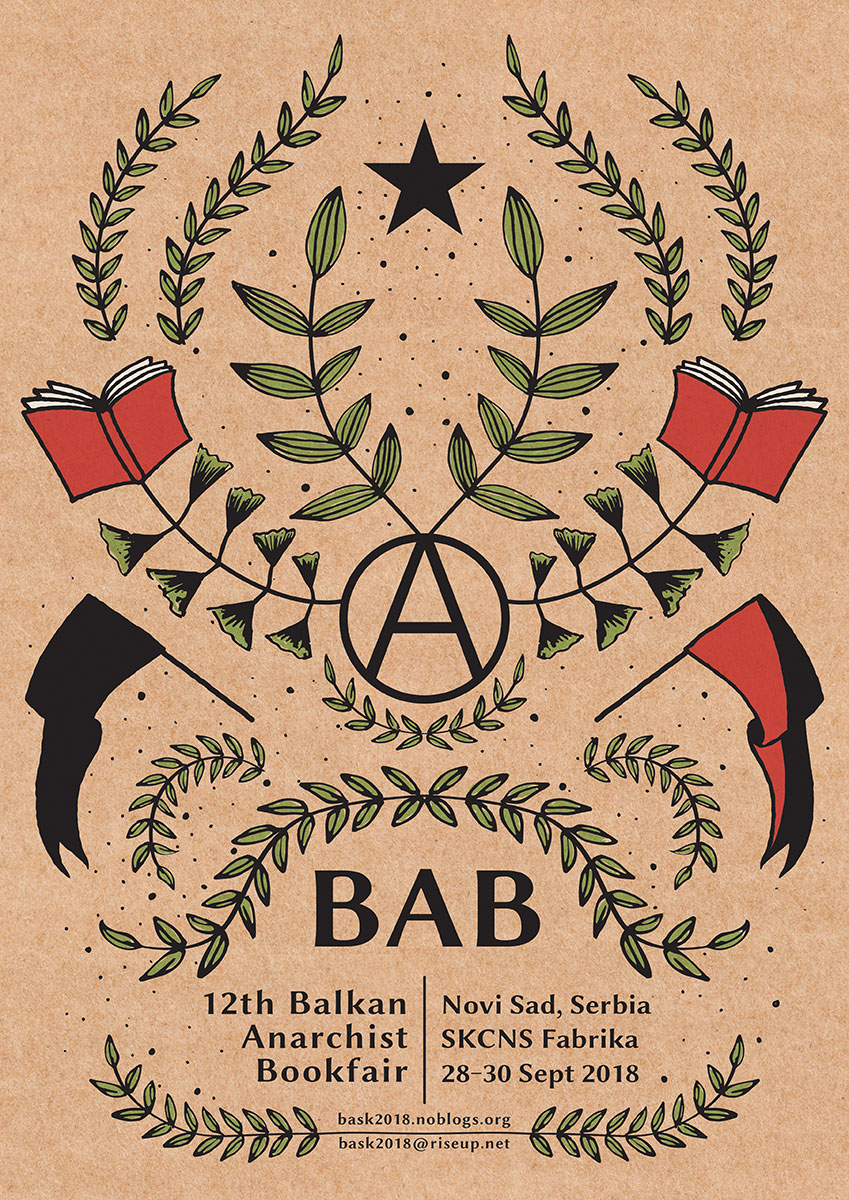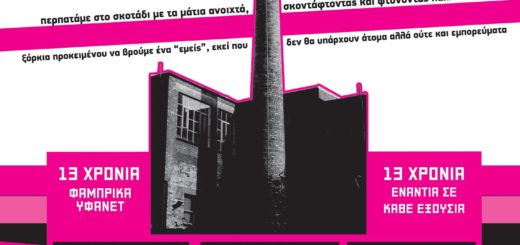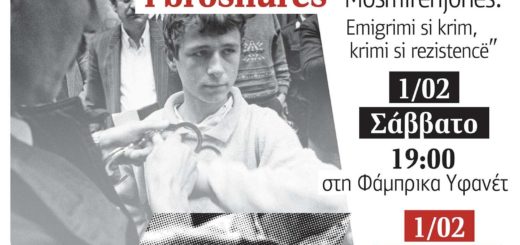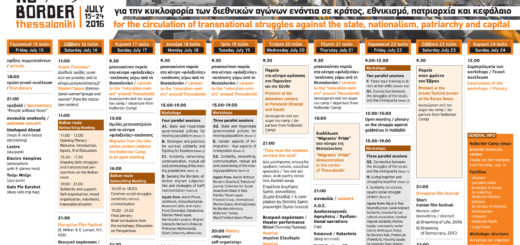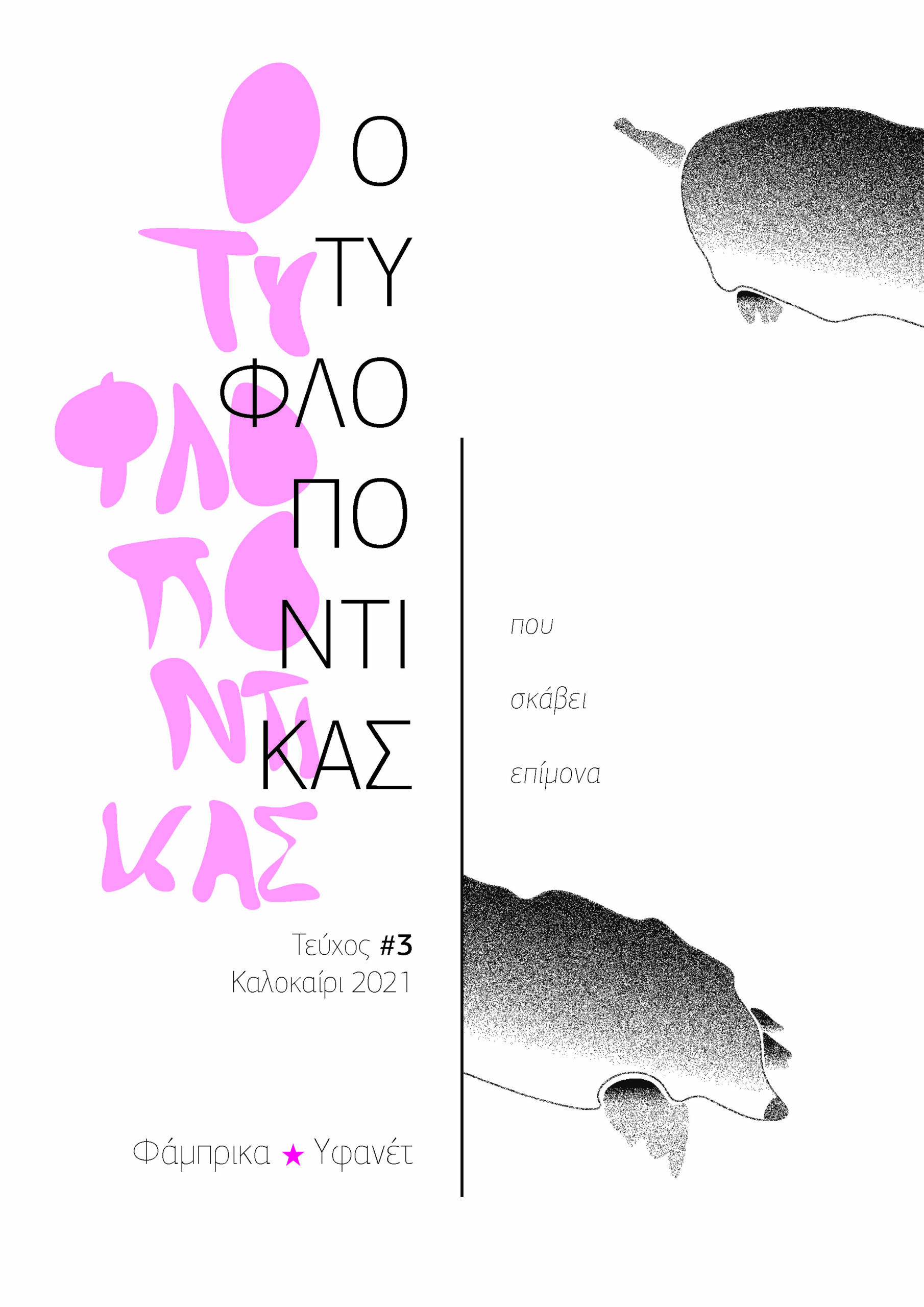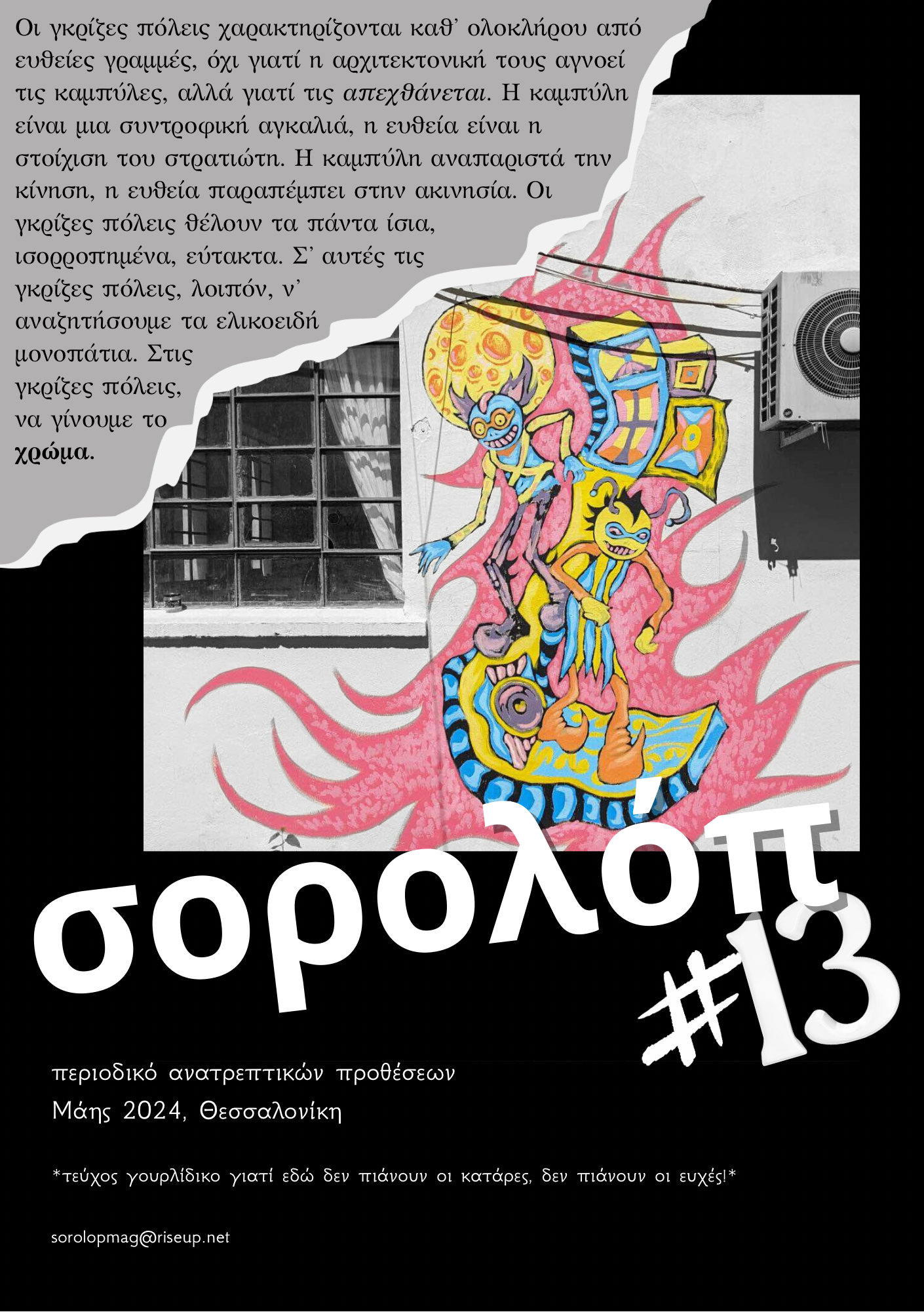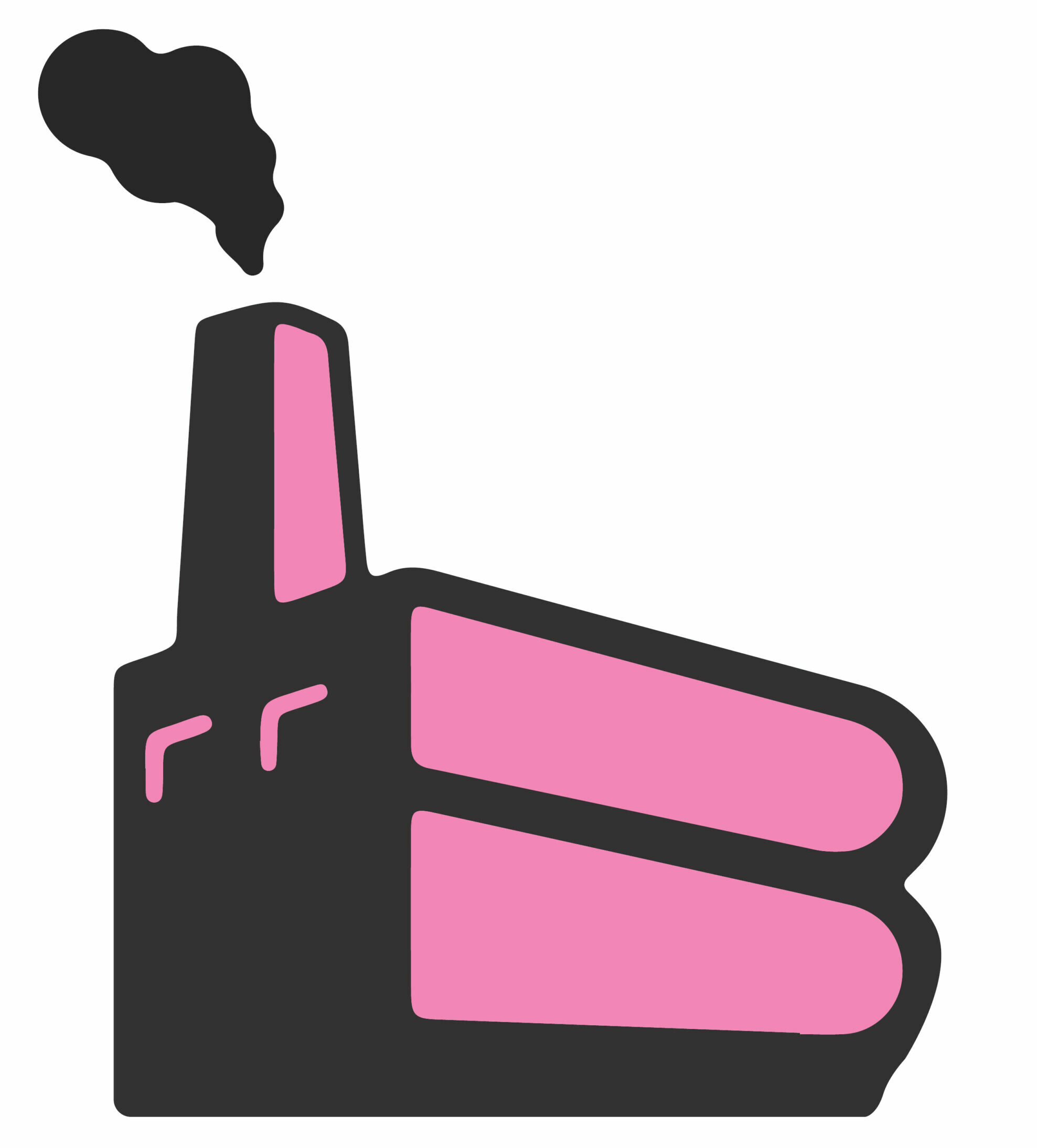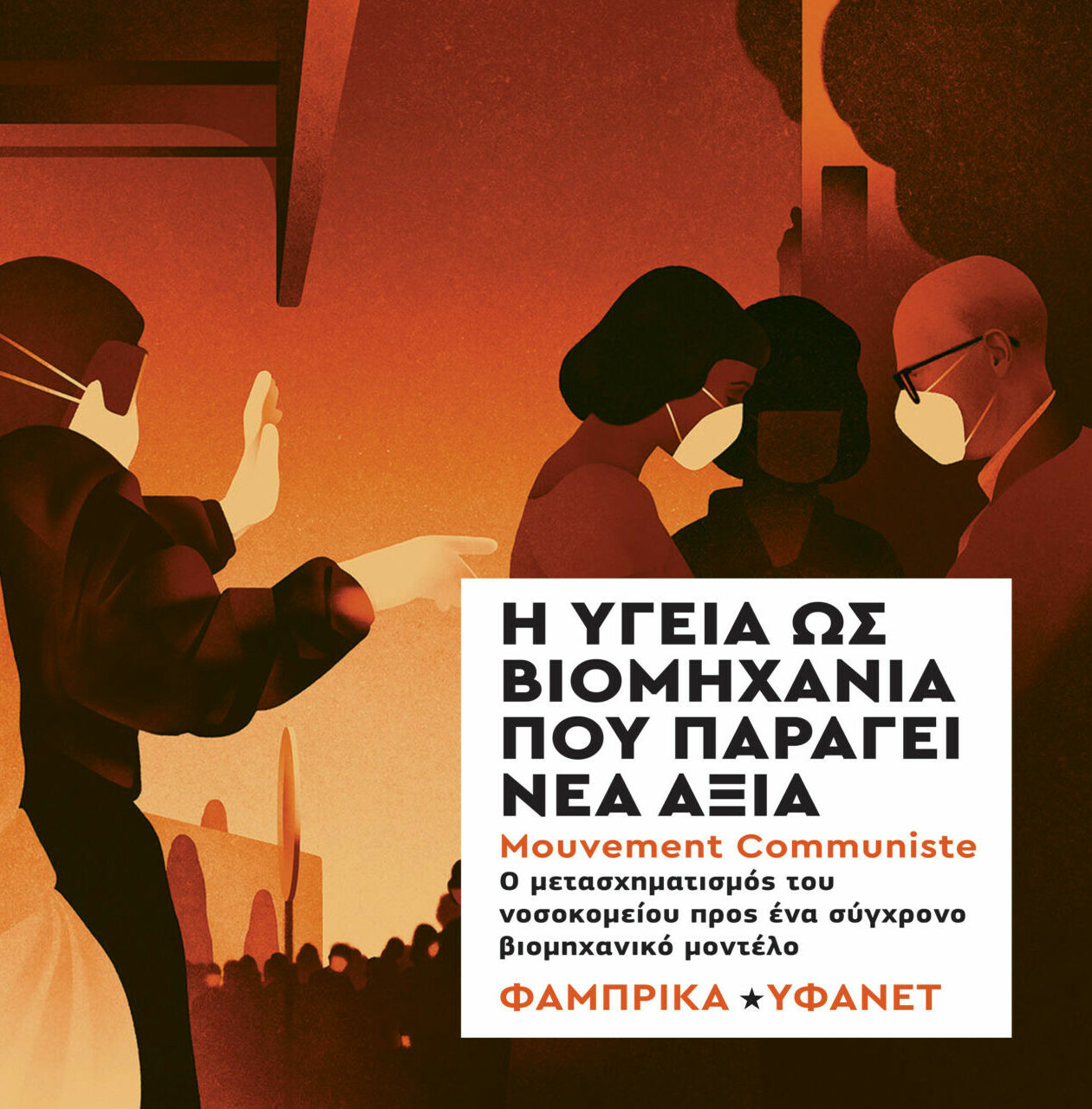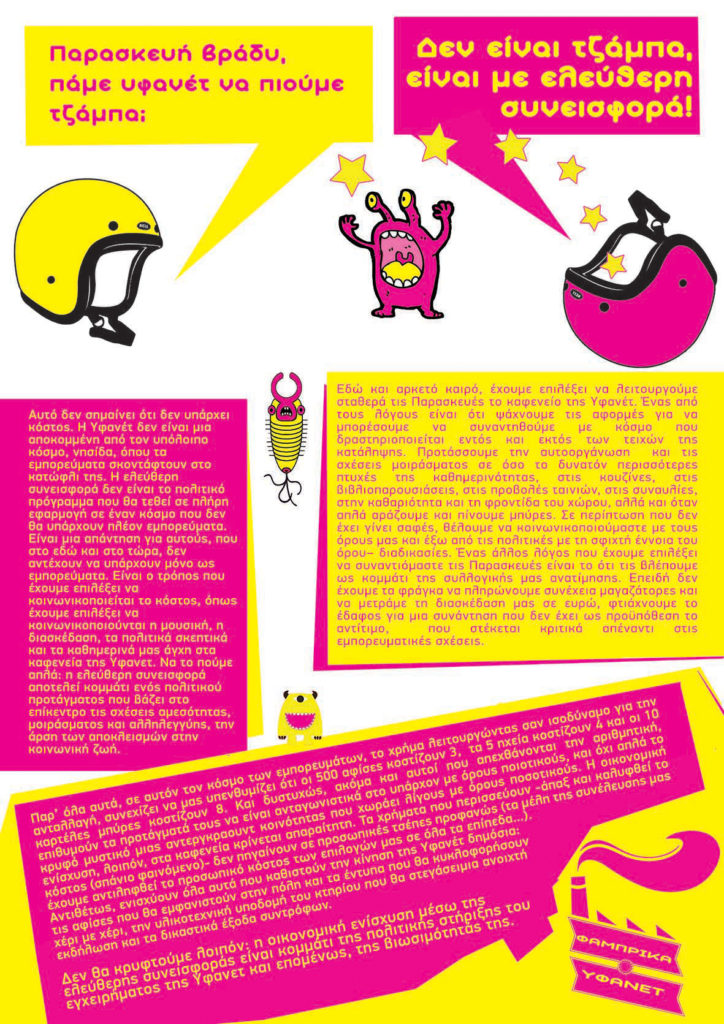FRIDAY, 28.09.2018.
15:00 – 21:00 | Bookfair – come and check the books of different publishers, free materials from various groups, newspapers, magazines…
16:30 Lunch
18.30 Talk:
Free the Röszke11 – a short update about the case of Ahmed
It has been three years that Ahmed H. is imprisoned in Hungary. He was arrested in September, 2015, during a protest at the border, directly after Hungary finished the erection of the fence between Serbia and Hungary. Later he was accused for terrorism, and his trial is still going on. The Hungarian state is continuously using his case to maintain the discourse about the connection between migration, illegality and terrorism, that became an important pillar of the state propaganda. On the one hand, the propaganda legitimized the normalization of violence on (and within) the borders. We can see that in the complete acceptance of concentration camps where people are systematically being starved, or in the silence about the tortures carried out by the ‘border hunters’, the border police unit. On the other hand, the propaganda enabled the state to launch an attack on civil society and on movements of resistance. During the summer, the parliament passed a law, the so-call ‘Stop Soros law’, that sets one year of prison sentence for ‘promoting and supporting illegal migration’. It means, that any form of migrant solidarity, from distributing leaflets to monitoring the violence at the border, is criminalized.
In the presentation we will give a short update about the case of Ahmed H. in the present context of Hungary.
The Harmanli 21 case
A court case against 21 refugees, 10 of whom imprisoned in Bulgaria (the rest’s whereabouts are currently unknown) for rebelling against the illegal turning of an open refugee camp into a closed quarantine zone – an action demanded by local nationalist parties who are currently in the government of Bulgaria.
19:30 Rebel City: Gentrification and Defense
(discussion // Anarhistična pobuda Ljubljana – APL)
Public spaces are increasingly being occupied by private bar terraces, while municipal authorities impose their authoritarian rule through compulsory subordination to the system of permits, passes and other cards – for trash bins, bus, library, parking etc. By now the words that denote these processes are widely known as gentrification, elitization and touristification and on first hearing they might sound quite tempting for many. They imply a promise of less traffic, cleaner air, more pedestrian areas, tidy and nice neighborhoods, plenty of entertainment-cultural program, innovative urban institutions and beneficial effects on economy of the city. Yet, the promise of such an improvement is crushed by reality for the vast majority of people.
In this context our autonomous spaces are acquiring new, previously seldom articulated significance. The truth is that it is due to the autonomous spaces that quite a few people still decide to stay in the city and contribute to it their skills, resources and life instead of leaving as so many others have during the last cycle of crises. It is in this context that together with other parts of the city autonomous spaces are under ever-increasing pressure from investors and local authorities to think through and come up with updated strategies for struggle for our spaces, our streets and squares.
SATURDAY, 29.09.2018.
10:00 – 21:00 | Bookfair – come and check the books of different publishers, free materials from various groups, newspapers, magazines…
11:00 Israeli anarchists in solidarity with the Palestinian liberation struggle
In this presentation, we’ll discuss the current events and the strengthening of the far right nationalism in Israel, the mass killings of demonstrators in Gaza and the groups that work to stop the occupation.
12:00 Promotion of the latest KKUSIUSK edition: “Living My Life”, E. Goldman and a discussion on the role and prospects of micro publishers in building and strengthening the libertarian movement in the Balkans
KKUSIUSK Babušnica is a pirate samizdat involved in translating and publishing works of nihilism and anarchism. The list of our favourite characters includes Winstenly and Bunyan, Perovskaya i Zhelyabov, Vera Figner and Zasulich, Louise Michel, Ema Goldman, Alexander Berkman etc. Since 2012
12:30 Presentation of “Bulletin” – a multi-lingual publication by a group of local and migrant activists from Thessaloniki
Presentation of a new group of local and migrant activists in Thessaloniki that started publishing multi-lingual magazine which is named “Bulletin”: breaking the borders, communicating and struggling together/ against anti-migration policies, racism, fascism, patriarchy and capital .
13:00 Anarchist union organizing and workers’ struggles in the Balkans exchange meeting
One of the many struggles we as anarchists participate in is class war. Facing transnational companies and labour struggles as well as massive emigration of workers from the Balkans to Western Europe and sharing many common structural problems across the region we think it is important to meet up, to exchange views and experiences, and to organise together. The meeting will start with updates on the activities and struggles of the different organisations and a brief report on the recently founded International Confederation of Labour (ICL) and then continue with an open discussion.
14:30 Lunch
16:00 “The Little Tree” – presentation of a self-organized pedagogical venture, that operates under the values of libertarian and experience-based learning
The “Little Tree that will become a forest”, is a self-organized pedagogical venture, that operates under the values of libertarian and experience-based learning. Its’ operation started in January 2014, in Thessaloniki. It consists of three groups, the children group, the parent and the teacher group. The first get together of the parents and teachers was a result of the need and desire for a different kind of education. An education, that on a first level, begins from respecting the individuality, the personal learning pace, the needs and desires of every child. On a second basis, it goes on to ensure that the child experiences a community of direct democracy, with such tools as inclusive education, mutual assistance and participation in the collective life. It is essential to us that in the pursuit of knowledge exploration and all-round growth, the children need to be accompanied with empathy, acceptance and sincerity. This kind of education is the one we try to make happen right here, right now in the community of “Little Tree”. Besides the aforementioned, it is equally important for us to struggle to publicly open the issue of libertarian education.
16:30 CrimethInc: Democracy and the Rise of Fascism
In a time of escalating authoritarianism, some seek to preserve democratic institutions and practices as the alternative to tyranny. Yet many of today’s far-right and fascist movements also present themselves as proponents of democracy, even direct democracy. The democratic process has brought Trump, the AfD, the Swedish Democrats, and Golden Dawn into the halls of government—not to mention Adolf Hitler.
Is democracy the opposite of fascism? What do they have in common, and what is their relationship at this moment in history? Using the CrimethInc. book From Democracy to Freedom as our point of departure, we will discuss the ways that democracy is interconnected with authoritarian institutions and propose other ways of framing the alternative we propose.
18:00 Anti-Lukov March
The annual anti-fascist protest taking place in Sofia against Lukovmarch – an international neo-nazi event happening each February in the same city and aspiring to become one of the main Neo-Nazi events in the Balkans
18:30 The two different aspects of nationalism in Greece regarding the Macedonia issue: The government, the radical patriots against the globalized capital and the battle for the public space in the city of Thessaloniki // Fabrika Yfanet Asssembly
The presentation is about what happened in the current nationalistic protests (for the Macedonian issue) that took place in Thessaloniki and led to the attacks to squats,the burning of Libertatia and also attacks against immigrants. Also we want to share our opinion in the continuity of the nationalistic protests in an every day scale ever since mainly in the city of Thessaloniki. In general in our text we have tried to describe how this large (in participation) protests became possible in 2018, what’s the differences with the 1992 massive protest and why the nationalistic protests try to present themselves as a resistance movement against the international capital. Furthermore we are going to present the two aspect of nationalism in Greece and the prospects of the creation of an anti-national movement, towards the re-appropriation of the public space.
19:00 Ungrateful: Migration as Crime, Crime as Resistance
Greek’s state strategy for the denigration of Albanian migrants, their experiences and our efforts for a common ground of resistance
Criminalisation of Albanian migrants was a crucial strategy of the Greek State in order to discipline them as a social group and devalue their labor force. A strategy that is directly connected with the capitalist growth during that period (end of 90’s – beginning of 00’s). Of course, this strategy would never have been effective if a major part of greek society didn’t go along, living the myth of Greece as a major stability force in the devastated Balkan area. From our initiative as a collective, started a discussion among Albanian migrants in an effort to make this experience (of criminalization) visible, public and to emphasize on its political aspects. By recognizing and making public their lived experience through the edition presented in the BAB, we aim to create a space where locals and migrants can struggle against state, capitalism and patriarchy as equals. For us, equality and anti-authority are not given facts but an objective embedded in our practices. We think that the story of criminalization is useful both as a politicization of the experience of Albanian migrants (ignored very often by the movement) and as a step to the creation of common spaces and equal relationships among migrants and locals.
20:00 Self-organized printing collectives in the greek antiauthoritarian movement (ROTTA – DRUCK – TITIVILLUS)
Nobody can count, or even estimate, the number and the copies of the printed material issued by the anarchist/antiauthoritarian/autonomous movement in the last 45 years of its continuous presence in greece. Despite the enormous needs in posters, leaflets, stickers, pamphlets, books and magazines, it was only until spring 2006 that the first printing machine was installed in the basement of the historic squat Villa Amalias in Athens. The years that followed 2 other printing collectives were formed in Thessaloniki and Ioannina. Let’s take a short trip to the history of these collectives…
21:00 Party
SUNDAY, 30.09.2018.
10:00 – 15:00 | Bookfair – come and check the books of different publishers, free materials from various groups, newspapers, magazines…
12:00 The Macedonian issue and it’s implications in the Greek context
12:30 Radical self-sufficiency – food production for autonomy
info meeting // Zadruga Urbana, Slovenia
This winter few initiatives from Balkan and Eastern Europe (Poland, Romania, Slovenia) had opportunity to meet in France on the gathering of the Reclaim the Fields network – that is uniting peasants and other collectives that are taking back control over food production – and decide to try meet again on the Balkan Anarchist Bookfair to share information regarding our strategies of working and to check, if there are some similar initiatives which we were not heave opportunity to meet yet or are just starting to working on this topics.
13:00 Presentation of the Self-education University ‘Svetozar Marković’
Self-education University ‘Svetozar Marković’ was founded in Belgrade and started its activities in April 2018. Saša Perić, one of the founders of this self-organized education platform, will speak about the development of this idea, the potentials and limitations of alternative education, current activities of the Self-education University and plans for the future.
Self-education University started as an attempt to create an alternative to the existing system of formal education in Serbia and it is based on the assumptions that all people possess certain knowledge they can share with others and that it is necessary to open up a space outside current institutions where all those who are interested will be able to participate in a completely open and democratic process of education. The accent is placed on removing the barriers between those who teach and those who are thought, encouraging dialogue and free exchange of knowledge, skills and opinions, and developing critical thinking that will help people to better understand the world we live in, to connect theory with praxis, and become the creators of social change.

